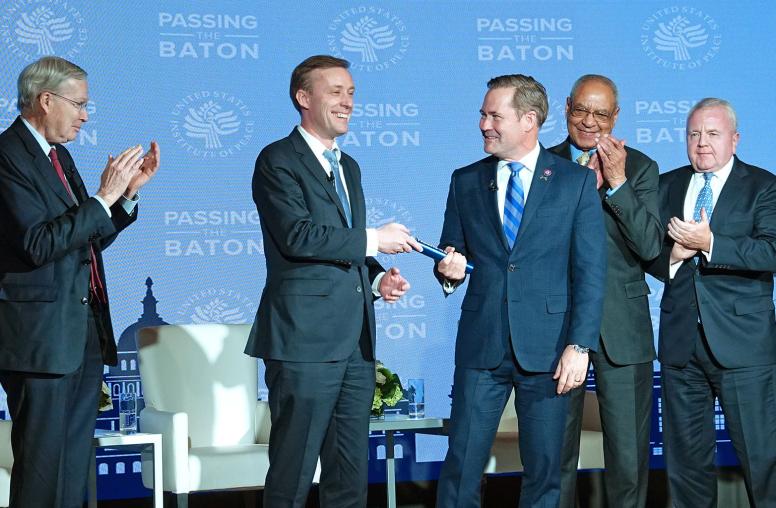Getting Granular: USIP Analyzes Specific Weaknesses In Afghan Security Environment
"Securing Afghanistan" strengthens case for urgent, sustainable reforms
"Securing Afghanistan" strengthens case for urgent, sustainable reforms Report's first-ever comprehensive analysis of international security assistance Shows many donors have not met their Afghan commitments
Contact:
Ian Larsen
+1 202 429 3870 (o)
+1 703 929 2099 (m)
A lack of focus on long-term sustainability, an inability to map the entirety of donor nations' security assistance programs and the subsequent failure on the part of the international community to understand precisely what is needed in Afghanistan are among the leading reasons why international stabilization efforts in the country have not been more successful over the last seven years, says a new report from the United States Institute of Peace.
Other top reasons include:
- a failure to see security as inclusive of rule of law institutions;
- an inability to deliver adequate mentoring for both army, police and justice personnel;
- a lack of understanding of the differing threats and networks operating in and across the borders of Afghanistan;
- poor or little coordination on security assistance among donor countries;
- a lack of political will among Afghan leaders to prosecute major criminal activity.
The report, Securing Afghanistan, is the result of a 12 -month investigation that sought to identify specific weaknesses in domestic and international efforts to stabilize Afghanistan and recommend specific reforms in the security sector. The volume is the second text focusing on the need to reform U.S. and international approaches to Afghanistan released by USIP in as many months. The Future of Afghanistan, published by the Institute in January 2009, takes a broader, macro-level approach to a number of the country's policy areas, while Securing Afghanistan provides a granular analysis of specific security needs.
Security issues in Afghanistan are extraordinarily complex, with multiple actors influencing the threat environment – among them, insurgent groups, criminal groups, local tribes, warlords, government officials and security forces. The country also presents a multi-front conflict that includes distinct security challenges in the northern, central and southern parts of the country.
Given this complexity, Securing Afghanistan authors C. Christine Fair and Seth G. Jones of the RAND Corporation undertook three distinct efforts to reach conclusions about Afghanistan's multifaceted security needs. They examined the existing security environment, assessed the programs put in place to address the threats, and identified existing gaps.
As part of the analysis, the authors set out to review the tens of billions of dollars in development assistance to Afghanistan offered by scores of countries and international organizations over the last seven years. The effort sought to compare these commitments to the benchmarks of success identified in the 2006 Afghanistan Compact.
Fair and Jones were surprised to find, however, that no comprehensive data on progress toward the benchmarks exist, nor is there reliable information on the total amount of resources actually contributed by donor countries.
Meanwhile, their research discovered that many donors have not met their financial commitments to the country. In some cases this is due to unfulfilled promises, while in other instances it is due to poor execution rates, high corruption, technical requirements of the contractor, and problems in the security environment. Fair and Jones found that considerable variability in donor disbursement exists, with countries like Japan and Canada having met approximately 90 percent of their commitments, but India and the Asian Development Bank, for example, have distributed only about one-third of their commitments.
"The lack of oversight -- or even basic understanding -- of the universe of international assistance programs at work in Afghanistan was one of the most striking findings of this report," says Fair. "The international community has shown a remarkable commitment to Afghanistan through its provision of resources and personnel, but only a fraction of that commitment is being met."
Donors' fluctuating ability to meet their commitments is beginning to show its effects in security situations throughout the country. Efforts to train a fully-functioning professional police force in Afghanistan have been disappointing as a result of incomplete or insufficient commitments by European governments and the EU and a continual shift of responsibility for the project among various U.S. government agencies. Meanwhile, progress toward creating a well-trained Afghan military have been relatively successful, but little focus has been placed on long-term sustainability of the effort.
"The issue of sustainability is key to all security issues in Afghanistan," says Jones. "Our study identified mixed rates of success across all areas of Afghanistan's security environment, but the lack of sustainability of the development programs that have been created is a common thread throughout. Afghanistan's government is struggling for legitimacy, and it cannot achieve that goal without being able to provide a sustainable security environment on its own. That is the single most significant concern in the long run. Without sustainability, Afghanistan's security environment would further deteriorate in the absence of international cooperation, yet too little attention is being paid to this essential fact."
Gap Analysis
The report authors also undertook an effort to identify the gaps in development and security assistance that are not being met by the international community or Afghanistan, either through outright omission or as the result of unmet commitments. "USIP commissioned this report," said Beth Cole, director of USIP's Afghanistan Security Assistance Mapping Project, "because no one, even in the White House, had a handle on what all the programs are." The following chart outlines the major threats, program goals, and gaps identified in this part of the study:
|
Threats |
Example of |
Gaps |
|
Insurgent groups (e.g. Taliban, Haqqani network, Gulbuddin Hekmatyar's Hezb-i-Islami, al Qa'ida, and Tehrek-e-Taliban-Pakistan) |
|
|
|
Criminal groups (e.g. drug-, timber-, and gem-trafficking organizations) |
|
|
|
Warlords and their militias |
|
|
|
Regional problems: including tensions with neighbors and state sanctuary |
|
|
Conclusions and Recommendations
The report concludes that urgent measures – what might be called "game changing" steps – are now needed to stem an increasingly violent insurgency within Afghanistan.
The United States and its international allies must re-examine their core objectives in Afghanistan, it says. The first objective should be to eliminate the use of Afghanistan and Pakistan as a base of operations for international terrorist groups (like al Qa'ida) and their allies (like the Taliban). As the September 11, 2001 attacks demonstrated, terrorist groups need a conducive environment in which to operate, and the Taliban-al Qa'ida relationship remains fairly strong. The second objective should be to relax the U.S. and international community's hope of building a central government strong enough to establish order throughout the country. Afghanistan's history suggests that stability has required a power-sharing arrangement between the central government and local entities.
Specifically, the report recommends that the international community:
- Adopt a bottom-up strategy to complement top-down efforts: Security and stability in Afghanistan have historically required a balance between top-down efforts to create a central government, and bottom-up efforts to secure local support and protect the population. Since 2001, the U.S. and international community have focused predominantly on top-down security efforts, including the establishment of an Afghan National Police and Afghan National Army. But the deteriorating situation and local nature of the insurgency require supporting district-level institutions that are Afghan-led and locally appropriate, with safeguards and oversight to establish order and deliver services.
- Shift from direct action to mentoring Afghan security forces: Successful counterinsurgency efforts hinge on the competence of local security forces, not international ones. More U.S. forces in Afghanistan may be helpful, but only if they are used to build Afghan capacity and to protect the local population. One critical need is to address the international partnering gap that has plagued efforts to improve Afghanistan's police and army. There is currently a 70 percent shortfall in international mentors for the police and a 30 percent shortfall for the army. This requires a crash effort to identify, train, and support mentors. European governments, the United States, and the UN should also devote more resources to mentoring and professionalizing the Ministry of Interior.
- Adopt a robust anti-corruption strategy and end impunity by prosecuting and removing corrupt officials: Pervasive corruption at all levels of the Afghan government is one of several factors fueling the insurgency by undermining local confidence in the government. Addressing this problem requires a serious and sustained campaign to prosecute corrupt officials through the justice system. This can include building better anti-corruption guarantors in all ministries, such as inspectors general offices, with mentoring and support from the U.S. and other NATO members. Recent Afghan efforts, such as the High Office of Oversight and Anti-Corruption, have failed to undermine corruption. The Ministry of Interior is a logical place to start since corruption in this ministry has undermined police reform, counter-narcotics efforts, and border security.
- Use the Afghan central budget: The chief problem in Afghanistan is not necessarily a lack of resources, but a better use of resources and one that builds governance, not weakens it. One key change would be to coordinate assistance through the Ministry of Finance and to develop a database that compiles and monitors international assistance to the country.
- Address relations with neighboring states and improve border security: Too few programs focus resources on fortifying Afghanistan's porous borders through which insurgents, narcotics, and other illicit goods travel with ease and often with the complicity of officials from Afghanistan and neighboring states. Greater programmatic attention should be devoted to improving Afghan-Pakistan relations and stabilizing the tribal belt. Admittedly, these efforts will not succeed without dedicated efforts to persuade Pakistan to fully engage in the effort to disable the Taliban and other militant groups.



